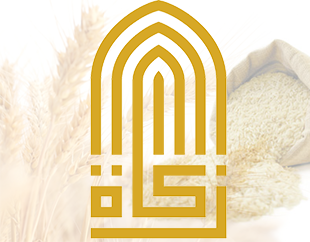
Zakat Al-Fitr has profound objectives and noble purposes, it carries within it high-class human and social dimensions, it has been ordained by Allah (SWT) on Muslims in the second year of Hijra and has obliged them to pay it after fasting the month of Ramadan. The commitment of Muslim to give Zakat shows their thanks to Allah for the blessing of fasting and their Solidarity with the poor and the needy. The Zakat also is a mean of purifying the soul of arrogance and vanity, and purifying the heart of self-love and selfishness. Here bellow are some provisions and purposes related to Zakat Al-Fitr.
Definition
Zakat al-Fitr is the amount deducted from the Muslim's food after the month of Ramadan and before Eid al-Fitr prayers in the form of food or money. Some call it Alms or Zakat Al-Abdan (bodies). The Zakat given by the Muslim is derived from "Fitrah" (creation), and called Zakat Al-Fitr in reference to its obligation to be given away before Eid Al-Fitr.
Legitimacy
Zakat al-Fitr derives its legitimacy from the Quran and Sunna and the consensus of Muslim scholars, in both ancient and modern times. Allah (SWT) has mentioned in Surat Al-Ala: "Success is surely achieved by him who purifies himself, and pronounces the name of his Lord, then offers prayer”. Ibn Umar reported that: “the Messenger of Allah (pbuh) prescribed Zakat-ul-Fitr of Ramadan one sa' of dates or one sa' of barley for every individual among the Muslims (whether) free man or slave, male or female, young or old”. Muslim Scholars unanimously agreed on its obligation and necessity, and that it’s one of the pillars of Islam. It was first imposed on Muslims in the second year of Hijra.
The wisdom behind Zakat
Zakat al-Fitr has a considerable wisdom and many great benefits that the Muslims will reap their fruits in both this World and the Hereafter. Amongst the benefits of Zakat Al-Fitr, the purification of the soul of the Muslim from selfishness and egoism, and the purification of his heart from hatred and disgust. Zakat Al-Fitr is also the appraisal of fasting and Qiyam during Ramadan and the compensation of any neglect that could occur while, performing these two rites (fasting and Qiyam) and conforming to their rules. Zakat al-Fitr also promotes the spirit of solidarity and brotherhood between Muslims, and brings in joy and happiness to the homes and hearts of the poor and the needy, which avoids them humiliation and abasement of asking for money and help during the day of Eid.
When Zakat is obligatory
Islamic Scholars differed on the exact time to give Zakat al-Fitr, but they advise to give it between the sunset of the last day of Ramadan and before Eid prayer, but they prefer that Zakat should be given between Fajr prayer and Eid prayer. Scholars also warn Muslims that it is not permissible to delay the payment of Zakat Al-Fitr more than that, Ibn 'Umar (mabpwt) reported that: “The Messenger of Allah (pbuh) ordered that the Sadaqat-ul-Fitr should be paid before the people go out for prayer”. Some Scholars authorize payments of Zakat in advance by one day or more in order to reach the beneficiaries if they are outside the country, and he who did not give Zakat –which is obligatory- despite his ability is a sinner, and he must pay it later as alms (Sadaqa) because he owes it to the poor.
The amount of Zakat
According to the Prophet (pbuh), Scholars agreed that the amount of Zakat al-Fitr that is obligatory on each individual is one Saa’ of nine categories of sustenance: wheat, barley, rye, corn, millet, rice, dates, raisins, and milk cruds. Some Scholars say that Zakat Al-Fitr should be paid out of these kinds of food or any others according to the food and sustenance of each country. The Saa’ in Arabic language is equal to four Mudd (whole handful), which is equivalent to three kilograms by the standards of our time.
Who should pay Zakat Al-Fitr?
Muslim Scholars unanimously agreed that Zakat Al-Fitr is obligatory on every Muslim for himself, and for all those under his responsibility male or female, young or old, fasting or not, this classification includes also relatives, spouses, poor parents, children until they reach adulthood and their ability to earn their living, girls until the departure to the marital home, and servants and others. But all of this is conditioned primarily on the ability of the concerned person to pay Zakat when it is obligatory, if he cannot pay it until after the due time, in this case it is not compulsory for him.
Who deserves it?
Zakat Al-Fitr is given to the poor and needy according to the directives of the Prophet (pbuh). Ibn ’Abbas (RAA) narrated, “The Messenger of Allah (pbuh) enjoined Zakat-Al-Fitr on the one who fasts (i.e. fasted during the month of Ramadan) to purify him from any indecent act or speech and for the purpose of providing food for the needy”. Zakat Al-Fitr can be given to relatives who are unable to pay it and orphans who cannot find what to spend. People who deserve Zakat most are neighbors and people of the country. In case of lack of poor, it would therefore be desirable to send it to the poor and the needy of other countries that need it most. It is not permissible to contribute with Zakat in the construction of mosques and charity projects. Zakat Al-Fitr shall not be paid to beneficiaries of Zakat Al-Maal (alms on wealth), and the workers who are associated to it, nor the Mujahedeen.
Written by: Amine Hilal

Comments